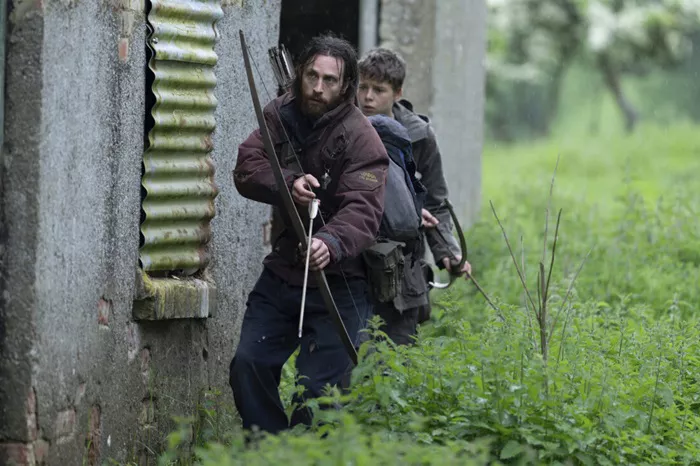Sony Pictures released this photo featuring Aaron Taylor-Johnson (left) and Alfie Williams in a scene from 28 Years Later.
Most films rarely predict the future, but Danny Boyle’s 2002 dystopian thriller 28 Days Later remarkably set the stage for two distinct cultural phenomena: global pandemics and fast-moving zombies.
Alongside breakout star Cillian Murphy, 28 Days Later foresaw an unprecedented societal fragility. While many were focused on the Afghanistan war and the rise of American Idol, Boyle and screenwriter Alex Garland explored how terror could swiftly upend the world.
Boyle insists the infected in his films are not traditional zombies, like the slow-moving monsters in George A. Romero’s Night of the Living Dead, but victims of a raging virus. The original film and its 2007 sequel 28 Weeks Later (directed by Juan Carlos Fresnadillo) track the devastating aftermath. The first film chronicles the virus spreading through London, while the second depicts the collapse of hopes for eradication.
Like the virus itself, the 28 Days Later franchise has proven difficult to extinguish. In the new installment, 28 Years Later, Boyle and Garland revisit the apocalypse with a firsthand understanding of pandemic realities. Yet, this intentionally chaotic and complex third film surprisingly sidelines recent history.
Sony Pictures released this photo showing Alfie Williams (left) and Ralph Fiennes in a scene from 28 Years Later.
Where many franchises escalate in spectacle and scale, 28 Years Later remains firmly rooted in the UK. The country is now a quarantine zone where the infected roam freely, while survivors—at least the ones we follow—gather on an island in northeast England, connected to the mainland by a tidal causeway.
Boyle and cinematographer Anthony Dod Mantle, who pioneered digital video in the original 28 Days Later, filmed much of the new movie using iPhones. Known for his meticulous style in films like Slumdog Millionaire and Trainspotting, Boyle’s work often jarringly fragments reality.
This visual approach, combined with the story’s bleak tone, made production difficult. Even as Boyle struggled to piece together the narrative, the film admirably avoids descending into a formulaic summer blockbuster.
The backdrop to 28 Years Later is less about COVID-19 and more a reflection on Brexit. With the virus isolating the UK, the nation has severed ties with mainland Europe. On the secluded island, 12-year-old Spike (Alfie Williams), a newcomer with a blend of innocence and bravery, lives with his hunter father Jamie (Aaron Taylor-Johnson) and bedridden mother Isla (Judi Comer).
The setting evokes a near-medieval survivalist lifestyle, with makeshift watchtowers and bows and arrows. Jamie sees himself as a knight, determined to prepare his son for this harsh world. When Spike leaves the island for the first time, his father shockingly helps him kill his first infected — a gruesome rite of passage. Back in the village, Jamie praises Spike for staying calm under pressure. But events soon lead Spike to question the hyper-masculine culture he’s grown up in.
“They’re all lying, Mom,” he tells his mother.
Spike hears rumors of a deranged doctor who sets fires and confounds the townsfolk. Determined to find a cure for his mother’s mysterious illness, Spike sets out to find this man. Their journey includes encounters with Ralph Fiennes’ doctor, clad in bright orange, and Edwin Ryding’s Swedish NATO soldier whose patrol boat crashes nearby. Meanwhile, Comer’s character slips into paranoia, often calling her son “Daddy.”
And what about the infected? The film portrays a spectrum: some remain Olympic-level sprinters, while others—mockingly dubbed “slowpokes”—crawl on the ground searching for bugs.
Beneath its gore and chaos, 28 Years Later offers a gentle meditation on death and misleading exceptions. Even hints of these ideas elevate the film above the typical summer fare. Considering how often spines are torn apart on screen, it stands out as a surprisingly soulful coming-of-age story.
Boyle’s unwavering dedication to the series is admirable. The upcoming 28 Days Later: Bone Temple, directed by Nia DaCosta, is set to continue the saga, with Boyle hopeful that 28 Years Later marks the beginning of a trilogy. Clearly, themes of infection and rage resonate with our times and show no sign of fading.
28 Years Later is rated R by the Motion Picture Association for intense bloody violence, horror, nudity, language, and brief sexual content. The film runs 115 minutes and receives a two-star rating out of four.
Related Topics
- Deep Cover (2025): Comedy, Crime, and Chaotic Charm
- The Life of Chuck: A Thoughtful Stephen King Adaptation
- What Is Longlegs Movie About Reddit?

